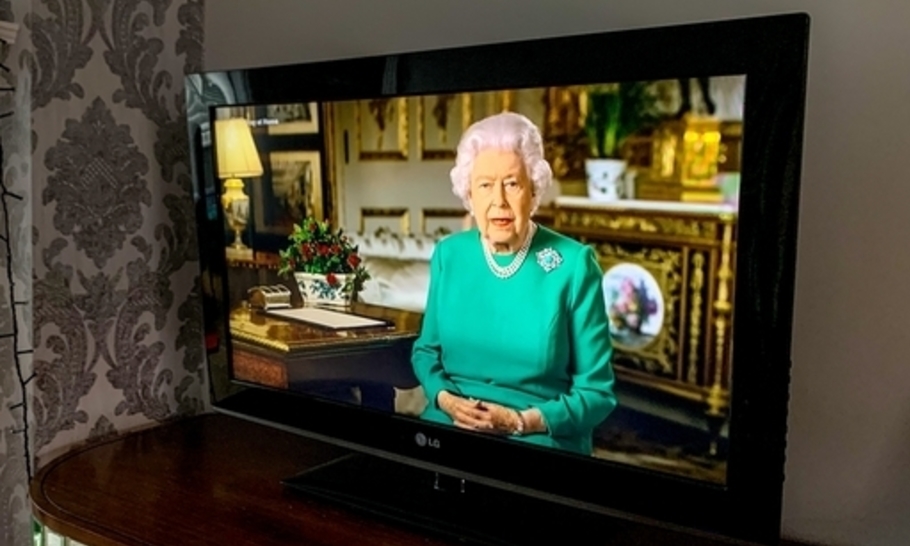Elizabeth II’s finest hour

(Photo by Robin Pope/NurPhoto)
When the Great Depression struck in the 1930s, words saved the day. President Franklin Roosevelt’s talks, delivered in “fireside chats” on the radio, calmed the public and reassured them that their money was safer in a bank than under the mattress. Without Roosevelt’s words, America’s banks wouldn’t have reopened, and without liquidity, there wouldn’t have been an economic recovery.
Last night, as our prime minister was taken to hospital in the midst of the Coronavirus Pandemic, Queen Elizabeth II gave the British people her fifth special broadcast in her 68-year reign (excluding the annual Royal Christmas Message). It was our fireside chat.
And it was a remarkable feat of rhetoric. Over twenty-two million people tuned in to watch the address and the words by which it will forever be known. “We’ll meet again” — that phrase graces the front pages of today’s Telegraph, Times, Guardian, Sun, Daily Mail and Daily Mirror. Britain loved it, America loved it, Australia loved it. NHS Nightingale applauded it and so did Twitter. Even the stock markets are up.
In 523 words — only 248 words more than Abraham Lincoln’s Gettysburg Address — the Queen managed to do what no Briton has done in recent memory: unite the country. Her address brought Remainers, Leavers, monarchists, republicans, unionists, separatists, Alastair Campbell and Piers Morgan together in commendation — no mean feat. Many will agree with the Telegraph’s Camilla Tominey, who has given her the epithet “Mother of the Nation”.
Of course, what the greatest speeches have in common is the fact that they respond to the challenge of the time in which they are delivered. Think of “We Shall Fight on the Beaches” and “I Have a Dream”. But it’s not just a question of timing. The speaker, and the words themselves, have to be just right. And last night, they were.
As always, the Queen was composed, not just an elder statesman but an elderly one, fragile yet resolute. She embodied ethos, or character, which the Roman statesman Cicero argued was one of the three qualities that made the best orators, along with logos (logic) and pathos (emotion). Meanwhile, her language was both simple (“I want to thank everyone on the NHS frontline”) and grand (“the pride in who we are is not a part of our past, it defines our present and our future”).
Like all great speeches, the Queen’s address didn’t try to be a great speech; it was one. Short of length and modest in tone, the Queen did little more than recognise the gravity of the situation, pay thanks to her citizens, express pride in her country and seek to provide hope. It wasn’t that different from her previous addresses, and it made Sir Keir Starmer’s acceptance speech at the weekend look like a schoolboy’s pitch for head prefect.
Elizabeth II is rarely spoken of as one of the great orators — it is Elizabeth I who fills the “greatest speeches” anthologies. Yet both this address and previous ones employ the same techniques that the greatest orators have used since Pericles: gratitude, personal anecdotes, pride of place, appeals to history and expressions of hope.
And if the Queen has Lincoln’s brevity, she understands, like Churchill did, the importance of prosody. Churchill used this to considerable effect in his “We Shall Fight on the Beaches” speech in 1940, the year when Elizabeth II gave her first broadcast, no less. In this speech, Churchill talked of “blood, toil, tears and sweat,” rather than “blood, sweat and tears,” — adding another monosyllable and greater consonance (the rhyme of consonants) to the common phrase, thereby giving it more punch, and a place in history.
The Queen’s address last night ended with an equally Churchillian passage: “we will be with our friends again; we will be with our families again; we will meet again”. This short passage of under twenty words utilises multiple rhetorical devices, including a triad, adverb endings, alliteration, iambic meter, repetition and an apt, clever allusion to Vera Lynn, an icon from the Second World War.
With her decades of public service and now her words too, our Queen has proven herself one of Britain’s greatest ever leaders. This was the message that we all wanted — and needed — to hear. Her address has not only restored public confidence, but also the value of eloquence in the age of Donald Trump. If you’re an English student struggling to find study material in lockdown, look no further than last night’s address.





